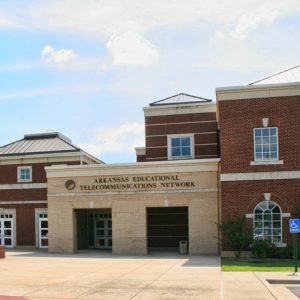calsfoundation@cals.org
Arkansas PBS
aka: AETN
Arkansas PBS, an agency of the State of Arkansas, is a non-commercial network designed to serve the people of Arkansas. Affiliated with the Public Broadcasting Service (PBS), it operated under the name Arkansas Educational Television Network until 2020. Arkansas PBS’s mission includes offering lifelong learning opportunities to all Arkansans, supplying instructional programs to Arkansas schools, providing programming and services to improve and enhance the lives of Arkansas citizens, and illuminating the culture and heritage of Arkansas and the world.
Arkansas PBS began on June 4, 1954, with the creation of the Arkansas Educational Television Association. This citizens’ group was interested in a non-commercial alternative to the growing commercial television enterprise. In 1961, after several years of lobbying and discussions, the Arkansas General Assembly passed Act 198 to help foster an educated, thinking populace using the new technology of television. The legislature, with the support of Governor Orval Faubus, set aside a small amount of funding to begin the process of planning for station KETS to serve central Arkansas.
R. Lee Reaves, a former Arkansas state senator, was selected to serve as the first director of the educational station. Several communities vied for the station, but Conway (Faulkner County) was selected after land was made available by Arkansas State Teachers College (now the University of Central Arkansas) and a significant contribution came from the Conway Corporation. Network headquarters were built, and the first broadcast of the Arkansas Educational Television Network aired on December 4, 1966. Over the next fifteen years, four additional transmitters were added to expand coverage to virtually the entire state.
Arkansas PBS’s broadcast center and four production studios are still located in Conway on land leased from the University of Central Arkansas (UCA). Arkansas PBS is licensed to the State of Arkansas. The eight-member, governor-appointed Arkansas Educational Television Commission is the governing body for the state network. Commissioners are appointed as representatives of public school education, higher education, the four U.S. congressional districts, women, and minorities. They serve eight-year terms.
Since it began broadcasting in 1966, Arkansas PBS has grown to a statewide network service. Six digital transmitters are located throughout the state: KAFT-13 in Fayetteville (Washington County); KEMV-6 in Mountain View (Stone County); KETG-9 in Arkadelphia (Clark County); KETS-2 in Little Rock (Pulaski County); KTEJ-19 in Jonesboro (Craighead County); and KETZ-12 in El Dorado (Union County). Viewership of Arkansas PBS extends throughout the state and into surrounding states; it is estimated that nearly nine percent of viewership comes from Missouri.
During the 1960s, 1970s, and 1980s, AETN became an educational resource for public school and college educators through the use of instructional videos with teacher guides and supplements for kindergarten through twelfth-grade classrooms. AETN also began offering college tele-courses, helping thousands of adults get college educations, and GED-ON-TV, helping thousands of adults prepare to take and pass the GED exam for a high school equivalency diploma.
During the mid-1990s, AETN began providing distance learning via broadcast, satellite, the Internet, and compressed video to allow for easier, cost-effective, and standardized educational professional development, as well as equal access for students to a wide variety of courses. Arkansas PBS’s instructional video-on-demand program for classroom teachers, in partnership with the Arkansas Department of Education (ADE), allows all Arkansas public schools access to more than 47,000 educational video clips, teacher guides, and interactive activities and has a ninety-five-percent usage rate. The innovative Arkansas PBS professional development online service, Arkansas IDEAS, provides training hours free to all Arkansas teachers and was awarded a national technology in education award by the Association of Public Television Stations in 2007.
In 2020, AETN announced that it would change its name to Arkansas PBS. The announcement referred to PBS as “the most trusted American institution,” in reference to consistent national polling indicating a high level of public trust and support for the institution over commercial cable and broadcast news.
Arkansas PBS broadcasts a full twenty-four-hour schedule, including three separate program streams on its digital channels for different audiences: AETN-HD, general audience programs seen in HD (with a simulcast on its analog channels); Arkansas PBS Create/Arkansas PBS Kids, with lifestyle and how-to programs for adults during the day shared with non-commercial, educational programs for children ages four through twelve during the evening; and Arkansas PBS LearningMedia, which provides classroom instructional support and educator development. Use of the network’s analog signal was discontinued in 2009 per government regulations, being replaced by digital broadcasts.
Arkansas PBS broadcasts a full PBS schedule supplemented with educational programming from various other sources. Arkansas PBS also produces programming designed specifically to help Arkansans with lifelong learning. These local productions have covered all genres and have included such shows as: The Arkansas Traveler, Arkansas Outdoors, Ozark Mountain Christmas, The Edge of Conflict: Arkansas in the Civil War, Arkansas Serenade, Aging Successfully with Doctor David, Precious Memories: Our Vanishing Rural Churches, Arkansans Ask, Men and Women of Distinction, Mothers in Prison–Children in Crisis, and AETN Presents.
Arkansas PBS has received more than 300 regional, national, and international awards for its local productions about and for Arkansas. Eight programs have received Emmy awards: The Edge of Conflict: Arkansas in the Civil War (1995), Lost Squadron (1998), Precious Memories: Our Vanishing Rural Churches (2000), When Lightning Struck: Saga of an American War Plane (2000), The Sound of Dreams (2002), The Forgotten Expedition (2003), Charles Banks Wilson (2007), and The Buffalo Flows (2009).
Nearly 10,000 Arkansas homes are tuned to Arkansas PBS during any given fifteen-minute period in the evening. The numbers are not at the top of local ratings but reflect Arkansas PBS’s commitment to educational, alternative programming. Half of all Arkansas PBS programming is related to family and children.
Funding for Arkansas PBS comes from a variety of sources, but at the center is voluntary contribution from viewers and members, making up about eighteen percent of network funding annually. Arkansas PBS has made a public commitment to use viewer funding to pay for programming and content. Three fund drives are held on the air each year, and Arkansas PBS has continued to hold steady or even reduce the days of such drives.
For additional information:
Arkansas PBS. https://www.myarkansaspbs.org/ (accessed October 6, 2020).
Massey, Klye. “Brand New: AETN, now Arkansas PBS, Looks to Turn Corner.” Arkansas Business, February 24–March 1, 2020, pp. 1, 10–11.
McFadin, Daniel. “$1M Grant Aids PBS Archives.” Arkansas Democrat-Gazette, July 5, 2023, pp. 1B, 2B. Online at https://www.arkansasonline.com/news/2023/jul/05/1-million-grant-gives-arkansas-pbs-the-resources/ (accessed July 5, 2023).
Taylor, Allie. “An Inquiry into Control of Content by the Arkansas Educational Television Network.” In First Amendment Studies: The Richard S. Arnold Prize Essays, edited by Stephen A. Smith. Fayetteville: University of Arkansas Press, 2016.
Tiffany L. Verkler
Arkansas Educational Television Network
 Arkansas Educational Television Network (AETN)
Arkansas Educational Television Network (AETN)  Gay White on AETN
Gay White on AETN 



Comments
No comments on this entry yet.